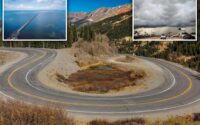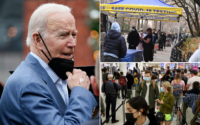City-dwellers are finding out camping is gross
When Christina Ramos announced she was going camping for the first time this summer, her friends got worried.
“They thought I wasn’t going to make it,” said the 29-year-old New Jersey native, who was planning an outdoors-oriented trip to Michigan for her friend Paola’s 29th birthday.
Determined to prove them wrong, Ramos spent weeks preparing for the trip, shelling out hundreds of dollars on what she thought was must-have gear from Amazon and Target.
Despite all her meticulous planning — and a roommate who even filmed an instructional video about how to properly set up a tent — Ramos had trouble assembling it.
“When I got to the campground, I don’t know why but I couldn’t get the video rolling,” she said.
As the pandemic presses on, city dwellers are turning to camping as a safe, socially distant alternative to typical travel, with online booking tools Campspot, Tentrr and Hipcamp all reporting upticks in usage. But newbies are quickly discovering there’s a lot more to sleeping outside than s’mores and sing-alongs.

“They’re amazed by the amount of bugs that they see and the variety, and how big they can get,” said Rafael Lopez, who runs the NYC Hiking and Backpacking Group on Facebook.
His group’s membership has been increasing steadily, at about 15 people a day. But the reports from newcomers aren’t always positive: “The lack of bathrooms is what scares people,” said Lopez. “And when you do have a bathroom, it’s the surprise of how dirty they are.”

Chelsea Janke tried to ward off potential surprises with a little micromanagement.
“I’m a stage manager, which means I’m prepared for every emergency,” said the 25-year-old Washington Heights resident.

And so for her first camping trip, in Lake George with boyfriend Jason McGuire in August, she had everything she needed — or so she thought.
For a hike, her backpack was weighed down by a book, Band-Aids, medicine, water bottles, washcloths — even an umbrella.
“Jason insisted on carrying it and it would get really heavy, and he’d be like, ‘Jesus, what did you pack?’ ”
Still, the rookie forgot a few crucial things, including layers. On a cold night, she had to borrow sweatpants from her boyfriend.
Travel writer Natalie Compton wasn’t totally inexperienced when she started camping regularly this summer, but she had never done it on her own.
“I had never been in charge of the logistics,” said the 29-year-old. “I was never the one packing the food and packing the tent.”

One decision she immediately regretted was failing to buy a sleeping pad: “It felt like I woke up and was hit by a bus,” she said.
Since then, she’s done overnights in the Catskills, Virginia and Connecticut. She has even chronicled some of her adventures for the Washington Post. But that doesn’t mean that she’s beyond the occasional mistake. There was the time she brought a portable charger that wasn’t actually charged, and the night she neglected to zip up her tent the whole way. When she woke up, she was soaked with rain.
“My sleeping bag was like a tea bag, dipped in a cup of tea,” Compton said.

Nevertheless, camping converts say that the hassles are worth it. Janke calls peering up at the stars “one of the most breathtaking moments of my life.”
And Ramos surprised her naysaying friends by surviving her camping trip — and even enjoying it. The views of Lake Superior were stunning, she said, and the whole trip was surprisingly affordable.
But the best part? They were so remote, “there was literally no cell service,” Ramos said. “If we ever had to go into town to pick up stuff, as soon as we got [there] my phone would start blowing up with all the messages I’m missing.”
Her response was swift: “Sorry guys, I don’t have that much service. I’ll talk to you when I get back.”


